The German Salad Linked To A Classic Fairy Tale
Among the popular salad greens that are widely eaten around the world, there's one that exists under a bewildering variety of names. In the U.S., for example, it's known as mâche — at least, that's been the popular American term since 1998, when Epic Roots founder Todd Koons began selling it both alone and as part of mixed greens salad offerings (per Produce Processing). Mâche is also the name it goes by in its native France, although it was historically known as doucette when first cultivated about 400 years ago, explains Specialty Produce.
The scientific name for this lettuce-like green is Valerianella locusta, but in Germany, it's better known as feldsalat (literally, "field salad"). This isn't just a case of a plant being given different names in different languages, however. In English alone, according to Britannica, this salad green has been referred to as mâche, corn salad, Lewiston corn salad, and lamb's lettuce.
That's not all — there's yet one more popular name associated with Valerianella locusta: Rapunzel. And yes, this name has something to do with the German fairy tale, though probably not in the way you'd first imagine.
How the name Rapunzel became associated with a fairy tale
The story of Rapunzel is very old, but it was most famously published in 1812 as one of a series of fairy tales collected by the Brothers Grimm, according to Dictionary.com. As you might remember from the tale (or from a modern retelling like Disney's "Tangled"), the story concerns a girl who is locked in a tower by an evil witch, but the girl's very long hair eventually proves to be her salvation.
What you might not remember is how the girl ends up with the witch in the first place. When the story begins, the as-yet-unborn Rapunzel is traded to the witch by her parents in exchange for a salad green. Yes, you guessed it: The green they wanted was lamb's lettuce — aka Valerianella locusta.
So Rapunzel lettuce isn't named after the fairy tale princess (spoiler alert: she eventually uses her long hair to meet a prince). Rather, the fairy tale princess is named after the lettuce Rapunzel. The moral of the story, we suppose, is that at least Rapunzel's mother and father understood the nutritional value of a good salad, though they were also horrible parents to give up a child in exchange for some greens. Luckily, you can easily enjoy Rapunzel — or mâche, or whatever your preferred term for Valerianella locusta — in a salad today without any outlandish fairy tale trade-offs.

